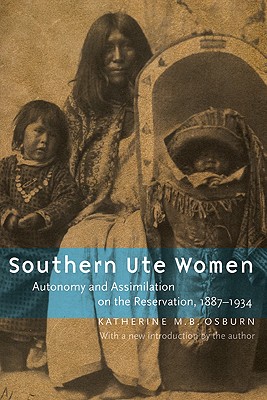Southern Ute Women: Autonomy and Assimilation on the Reservation, 1887-1934

Southern Ute Women: Autonomy and Assimilation on the Reservation, 1887-1934
After the passage of the Dawes Severalty Act in 1887, the Southern Ute Agency was the scene of an intense federal effort to assimilate the Ute Indians. The Southern Utes were to break up their common land holdings and transform themselves into middle-class patriarchal farm and pastoral families. In this assimilationist scheme, women were to surrender the considerable autonomy they enjoyed in traditional Ute society and become housebound homemakers, the "civilizers" of their fathers, husbands, brothers, and sons. Southern Ute Women shows that these women accommodated Anglo ways that benefited them but refused to give up indigenous culture and ways that gave their lives meaning and bolstered personal autonomy. In spite of federal policies that stripped women of many legal rights, Southern Ute women demanded participation in political, economic, and legal decisions that affected their lives and insisted on retaining control over their marital and sexual behavior.
Katherine M. B. Osburn is a professor of history at Tennessee Technological University in Cookeville.
Descrierea produsului
After the passage of the Dawes Severalty Act in 1887, the Southern Ute Agency was the scene of an intense federal effort to assimilate the Ute Indians. The Southern Utes were to break up their common land holdings and transform themselves into middle-class patriarchal farm and pastoral families. In this assimilationist scheme, women were to surrender the considerable autonomy they enjoyed in traditional Ute society and become housebound homemakers, the "civilizers" of their fathers, husbands, brothers, and sons. Southern Ute Women shows that these women accommodated Anglo ways that benefited them but refused to give up indigenous culture and ways that gave their lives meaning and bolstered personal autonomy. In spite of federal policies that stripped women of many legal rights, Southern Ute women demanded participation in political, economic, and legal decisions that affected their lives and insisted on retaining control over their marital and sexual behavior.
Katherine M. B. Osburn is a professor of history at Tennessee Technological University in Cookeville.
Detaliile produsului












